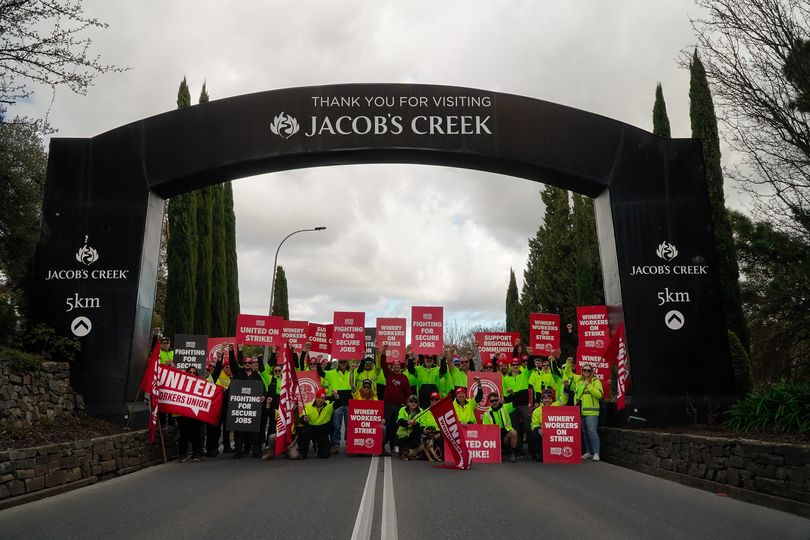What do wine industry and early childhood education workers have in common?
Written by: Ned K. on 11 August 2024
(Above: Winery workers in the Barossa take action. Source UWU facebook page)
Wine industry workers employed by Pernod Ricard in the Barossa Valley last week escalated industrial action to strike action. They are using the limited rights of workers to take "protected industrial action" during a bargaining period for a new Enterprise Agreement. Their key demands are for above inflation rate pay increases and a three-year Enterprise Agreement.
In the previous Enterprise Agreement workers accepted wage increases below the inflation rate. Cost of living pressures on wine industry workers are no different from those experienced by any other worker and in their view, Pernod Ricard is a French owned multinational corporation whose profits go into the hundreds of millions of dollars.
Pernod Ricard want a one-year Agreement so that the sell off of their wineries in the Barossa Valley to Accolade will make it easier for Accolade to force through changes they want to workers’ conditions when they become the workers' employer. Accolade has been owned by the Carlyle Group, an American private equity company, since 2018.
So, the strike by wine industry workers is also very much about job security of conditions they have won over many years of previous struggles.
The workers have a lot of community support in the Barossa Valley. They also are well organized on the job with good networks of leaders in the wineries, enabling them to make collective decisions on when to intensify their "protected actions" in a way that keeps pressure on the employer to agree to their key demands.
At the same time as wine industry workers took strike action against multinational Pernod Ricard, the Albanese Government finally announced that Early Childhood Education workers would have their wages increased by 15%. Labor had dragged its heels in showing their hand on funding wage increases for Early Childhood sector workers, with this procrastination extending back to the days of Rudd and Gillard Governments.
The 15% increase will be split into a 10% increase from December 2024 and another 5% increase from December 2025. The increases, funded by the federal government, are conditional on Early Childhood Education Centres increasing fees paid by parents to a maximum of 4.4% over the next year. The Centre employers will only be provided with increased funding for the wage increases once they complete Fair Work approved enterprise agreements with their workers and their Union.
Why did the Albanese Government make the announcement for a 15% wage increase to these workers at this time?
Early Childhood Education Centres have become essential for the operation of capitalism in Australia. Employers in all industries require both men and women workers, and parents with young children need Centres to be able to both work. Whether two parent or single parent families, workers need to work to survive and keep up with rising living costs.
However, the wages in the sector are so low that turnover of labour is high, and attracting new workers to Early Childhood Education has reached an all-time low.
So, the Albanese Government did the sector's employers a favour by raising wages of the workers.
What the Albanese Government announcement of the 15% wage increase did not say was that the Early Childhood workers had forced major private sector employers in the sector to negotiate a multi-employer Enterprise Agreement with a demand for a 25% wage increase.
Workers elected hundreds of Delegates across Australia to represent them in the negotiations and like the Pernod Ricard Delegates in the wine industry, they and their members were well organized and in a strong enough position to take sector wide strike action ('protected industrial action') if the Government did not announce a substantial funding of wage increases for the sector.
The mainly women workers also knew that the Albanese Government has an election coming up pretty soon. Early Childhood Education workers on the war path at election time would be a headache for any current government.
The actual industrial action by winery workers and the threat of sector wide industrial action by Early Childhood workers show that vastly different sections of the working class relying on the power of the collective are a mighty force.
Print Version - new window Email article
-----
Go back
Independence from Imperialism
People's Rights & Liberties
Community and Environment
Marxism Today
International
Articles
| Boss Class Agenda or an Independent Working Class Agenda? |
| Workers united struggle under re-elected ALP government is needed |
| Workers’ struggle as a class gives life to ACTU's "strength in numbers, power in solidarity, we are unstoppable" |
| Farm Numbers Down - Farm Debt Up |
| Building struggle around an independent working class agenda is the key |
| Labor hire warehouse workers and government support service workers win through struggle |
| Vale Ron Owens |
| Tasmanian potato growers spitting chips |
| Workers are revolting despite restrictions on strike action |
| "Productivity" for workers means job losses and higher workloads |
| Forewarned is forearmed: Economic Reform Roundtable |
| Public sector workers take on SA government |
| Courts uphold government attack on militant union |
| Support BAE shipworkers’ action for same job, same pay |
| Labor Sweeps to Power: Now It’s Time to Deliver for Workers |
| Dystopia and the Sacrosanct Elephant |
| Workers Strike at PepsiCo's Snack Foods Factory - An Example of The Leading Class In Action |
| ALBANESE DEFINES LABOR PARTY - "MAINSTREAM" and "REFORMIST NOT REVOLUTIONARY" |
| May Day Greetings from CPA (M-L) |
| NSW construction workers to march on May 1 |
-----

